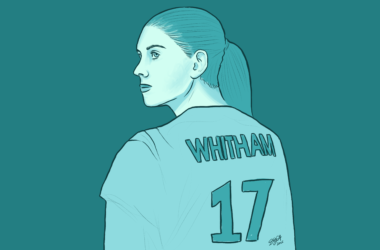While very few university students can say that they are on their country’s national rowing team, even fewer can say that they have won a medal at the World Rowing Championships. However, Derek O’Farrell can lay claim to both. Over the summer, the U4 physiology student finished third in the Men’s Coxed Pair at the under-23 World Rowing Championship in Eton, UK, becoming the first McGill rower to ever reach the podium at a World Championship.
What’s even more remarkable is that rowing only recently became a major part of O’Farrell’s life.
“I started rowing at McGill,” O’Farrell said. “Before I came here, I had never really seen or heard of rowing as a sport other than on TV, so I really came in with no experience. I was just sitting on the field when I got a flyer to come try out for the rowing team. So I thought, ‘Oh, why not?'”.
The road to bronze
Despite O’Farrell’s achievements, his life has not been different from most young Canadians. Growing up in Unionville, Ontario., O’Farrell’s sport of choice was hockey. Also, like many students in Canada, O’Farrell says that he always wanted to come to McGill-though it never had anything to do with rowing. On the contrary, he has always wanted to become a doctor.
But in rowing, O’Farrell found a new passion – one that would be difficult to master. Intense training and dedication is what it has taken to make his dramatic progression in the sport.
“When I first started, I was surrounded by people who were way better than me,” O’Farrell said. “I saw how dedicated they were to the sport and I really started to fit into their niche. I trained with them hard, and I just naturally progressed. When I started out as a novice, I would try to train once a day if possible and then when I decided to try out for the national team, it was more like twice a day. On the national team, you move out to Victoria to train-they train three times a day on the water. It’s like a full-time job.”
Teammate and club President John Muratori concurred with O’Farrell, explaining that like any sport, only those who go the extra mile in training will succeed in the long term.
“The training program is as difficult as any other top tier sport,” Muratoni said. “We’re up at 5:30 a.m. and train for two and a half hours. If you’re serious about it, like Derek is, you also have to be committed to additional workouts and developing beyond the normal practices. Like any sport, you need to be there putting in the extra time. That’s where Derek really achieved success”.
“Derek is a guy who loves the ‘urge’ to train and loving the urge is what is needed in this sport to reach the highest levels,” Muratori added.
Still, O’Farrell owes much of his advancement in rowing to McGill.
“[The McGill system] is a really, really good system,” he said. “You can take someone who’s never rowed or even seen a real boat before and turn them into a varsity athlete and maybe even a national team rower.”
Muratoni agreed with O’Farrell’s assessment, believing that O’Farrell’s progress and success were greatly enhanced by McGill’s rowing program.
“It’s a testament to the structure,” Muratoni said. “Derek started off in the novice program, basically someone who’s never raced before. Really, it’s a tribute to the McGill Rowing system that we can take someone who’s never been in a boat and take them to the top level in the sport.”
The future
Considering that most rowers peak in their late 20s, O’Farrell has a pretty bright future ahead of him. Asked if he intends to carry on rowing or pursue medicine instead, O’Farrell is clearly keeping his options open.
“The passion [of being a doctor] has been a little bit deflected for now,” O’Farrell said. “But I’m sure that once I decide what I’m going to do with my life I’ll have the same passion that I had for rowing and I’ll drive for it”.
And we would all hope that O’Farrell does indeed drive for it: for McGill, for Canada and for himself. Whether he chooses a career in medicine or rowing, O’Farrell has good options on all sides.
-additional reporting by David Blye and Aaron Sigal








